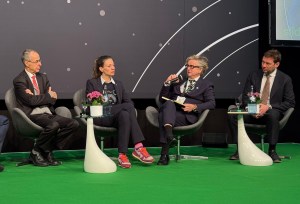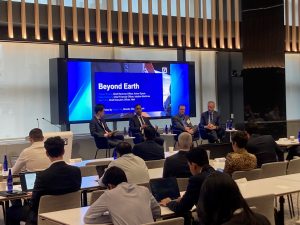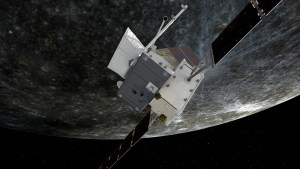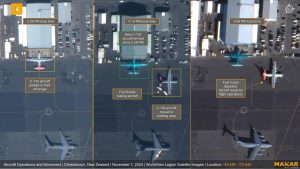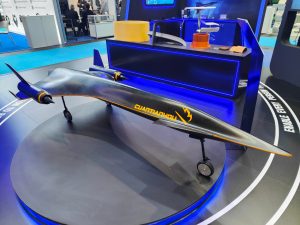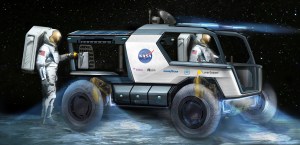In today’s day and time, which is defined by rapid technological advancements, the fusion of artificial intelligence (AI) and gaming presents a globally innovative opportunity to tackle some of the world’s most pressing issues.
Traditionally viewed as two separate, distinct domains, AI and gaming together have the potential to revolutionize the way we approach work, life, and complex global challenges.
This combination builds a superpower technology that can connect AI’s analytical prowess and gaming’s engaging, educational frameworks to create innovative solutions for real-world problems such as forest fires, poverty, and homelessness.
The merging of AI and gaming offers an innovative and revolutionary approach to problem-solving that goes beyond conventional methods in current existence. AI offers some unequaled analytical power and predictive capabilities, enabling precise and efficient strategies for addressing complex issues.
Concurrently, gaming provides immersive and interactive environments that can train, educate, and engage individuals in meaningful ways. When these technologies are integrated, they open up new possibilities into opportunities for developing effective and creative solutions to the world’s most daunting challenges.
Turning possibilities into opportunities
Taking a look at Plato’s Allegory of the Cave, where insight is achieved by seeing beyond the shadows to understand true reality, we can turn possibilities into opportunities by exceeding traditional problem-solving paradigms with the combination of AI and gaming.
By integrating AI and gaming, we can uncover innovative and effective strategies to address really complex global issues. This combination of AI and gaming together is not just a real gamechanger, but it also broadens our perspectives and equips us with innovative tools to combat real-world, everyday challenges like forest fires, poverty, and homelessness, ultimately shining a light on paths to a brighter and more sustainable future.
Like Plato’s Allegory of a Cave, it is the things we don’t see. Many times, we do not see opportunities because they seem so small, but it is the things that seem like the smallest changes that can create the biggest impact.
For example, a one-degree increase in temperature in a specific region, county, or state can lead to significant local impacts. This seemingly small change can result in more frequent and intense heatwaves, affecting public health, particularly among vulnerable populations.
It can disrupt agriculture by altering crop growth cycles and reducing yields, leading to economic losses for farmers. These are two of the many side effects of such a small shift in temperature for a region.
In summation, we can certainly use AI and gaming as a way to garner insight into how our actions affect things like the weather. Gaming for AI can profoundly impact human existence and the natural world in both small and large ways, leading to a healthier, more sustainable, and efficient world, benefiting both humans and nature.
You’re not just another Joe Schmo
What if you could be the person who solves a food crisis with a great idea? In this case, you’re not just another Joe Schmo; you are someone who has made an expansive difference.
The key is access both for great ideas and for the ideas to be actualized. Currently, everyday citizens primarily engage with societal economics and decision-making processes as voters and lobbyists, often in peripheral capacities.
This marginal involvement poses significant challenges for individuals who wish to be heard and actively participate in shaping their communities. The complexity and opacity of the decision-making mechanisms that impact their daily lives—both in the short and long term—further exacerbate these challenges.
Everyday citizens are frequently far removed from the intricate workings of policy-making and economic planning, leading to a disconnect between public needs and decision-makers’ actions.
This gap hinders the ability of communities to leverage the valuable insights and contributions that citizens can offer. However, the integration of Artificial Intelligence (AI) and gaming presents a promising solution to bridge this gap. AI can process and analyze vast amounts of data, providing citizens with accessible information and actionable insights.
Simultaneously, gaming can engage individuals in interactive and immersive experiences, making complex concepts more understandable and decision-making processes more transparent. Together, AI and gaming can create platforms that empower citizens to participate more effectively in their communities.
These technologies can facilitate better understanding, communication, and collaboration, enabling citizens to contribute meaningfully to the decisions that shape their lives. In this way, AI and gaming can transform the role of citizens from passive observers to active participants in the governance and development of their communities.
Additionally, these technologies provide a sort of ‘checks and balances’ to existing and ongoing corruption within political and economic decision-making. AI’s data analysis capabilities can uncover patterns of corruption and inefficiencies, while gaming can foster greater transparency and accountability by involving citizens directly in oversight and decision-making processes.
This dual approach enhances citizen engagement and promotes integrity and trust within the systems that govern their communities.
Sim City, Glacia, United States, 09990
What if you could live in the perfect city? No crime, no poverty, no pollution or disease, and many of the things that plague humans today. Yes this is a utopia, and while currently not possible, we can certainly aim to get to this place.
I call it Sim City, Glacia, United States, 09990. Welcome to a place where your most vivid life simulations transform into reality. Here, water flows abundantly, ensuring a lush and vibrant environment. Everything around you is a striking shade of green, the zip code perfectly matching the hex code 09990, creating a harmonious and visually stunning landscape.
In Sim City, every detail is meticulously crafted to offer an unparalleled experience, making it the ultimate destination for those seeking a blend of nature and technology in perfect balance.
One great example of a video game that could, in concept, integrate well with AI is the video game “Sim City.” Traditionally, Sim City has been a platform where players manage and build cities, dealing with various challenges such as crime, pollution, and traffic. By leveraging AI within Sim City, we can transform it into a powerful tool for real-world problem-solving. Here are some of the opportunities I see available by using Sim City as an existing concept:
1. Citizen engagement and idea generation:
Sim City can serve as a simulation platform where everyday citizens experiment with urban planning and policy decisions in a risk-free environment. With AI analyzing these simulations, we can gather valuable data on what strategies work best for addressing issues like crime, poverty, and homelessness.
Players’ innovative solutions can be evaluated and refined using AI algorithms, creating a repository of effective strategies that urban planners and policymakers can consider.
Additionally, we can track ownership of such ideas by incorporating other solutions such as NFTs and blockchain. For example, the ownership of such innovative platforms can be commercialized, with profits traced and returned to individual citizens.
This model can inspire economic prosperity by ensuring that the financial benefits derived from these technologies are shared among the community members who use and contribute to them. By distributing profits back to citizens, we can create a more inclusive and equitable economic system, further motivating public involvement and investment in community development initiatives.
2. Environmental management and disaster preparedness:
Sim City can integrate AI-driven models for environmental management and disaster preparedness. For example, players can simulate the impact of various policies on forest fires, pollution levels, and climate change.
AI can provide real-time feedback on the potential outcomes of different strategies, helping players understand the long-term effects of their decisions. This approach can create a ‘Butterfly Effect’ scenario, allowing players to emotionally connect with virtual citizens and see how potential outcomes might reflect real-life consequences.
This gamified experience can educate citizens on the importance of sustainable practices and disaster preparedness, fostering a more informed and proactive society.
3. Traffic and urban infrastructure:
Traffic congestion and inefficient urban infrastructure are significant challenges in many cities. Players can experiment with different urban designs and traffic management strategies by incorporating AI into Sim City. AI can analyze the effectiveness of these strategies, providing insights into optimizing traffic flow and reducing congestion.
This data can be invaluable for urban planners looking to implement smart city solutions.
4. Social issues and community building:
Sim City can also address social issues such as poverty and homelessness. Players can test various social policies, such as affordable housing projects, job creation programs, and community support initiatives.
AI can evaluate the impact of these policies on the virtual city’s population, highlighting successful approaches that can be applied in the real world. This interactive and educational experience can raise awareness and drive public support for effective social policies.
This is not a game, this is real life
I recently had to move from one condo to another in San Diego because my landlord was ending their contract with my building. While packing, I had to dispose of my perishable foods as I was about to travel internationally for a few weeks. Naturally, I didn’t want to waste the food.
The timing was incredibly inconvenient. I was notified about the move just 36 hours before my flight from Los Angeles International, leaving me with a very tight schedule. I hoped to find people in need to give the food to, but ironically, despite having so much to give, I couldn’t find anyone to take it during my drive from San Diego to Los Angeles.
Regrettably, I ended up throwing it away because I didn’t have the time to search for people in need without risking missing my flight. Many U.S. cities are exploring AI automation and predictive technologies to locate and assist those who are destitute and economically disadvantaged. However, I don’t see these efforts being democratized to address the issue effectively. The core problem is access—connecting disadvantaged individuals back to mainstream society.
A food revolution for poverty
The dilemma of having to dispose of perishable foods before an international trip due to a last-minute move is a common issue, reflecting broader challenges in resource redistribution.
However, combining AI and gaming can offer innovative solutions to this problem, akin to a real-world SimCity. Imagine a simulation-based resource allocation platform that uses AI to predict, simulate, and optimize the flow of surplus resources in urban environments.
This platform would track and forecast when and where surplus food will become available by integrating data from grocery stores, restaurants, and households. It would identify areas with the highest need for resources through socioeconomic data and real-time inputs from local organizations.
AI could match surplus food providers with recipients in need, optimizing routes to ensure timely delivery and reducing waste. Gamification elements would engage users in managing and improving the virtual city’s resource allocation, offering challenges to allocate resources and build community involvement efficiently.
Users could log surplus food or request assistance via a mobile app, receiving push notifications about nearby opportunities to donate or collect resources. Collaborating with food banks, shelters, and community organizations would enhance the platform’s effectiveness by providing real-time data and aiding in distribution.
In practical terms, when faced with surplus food, you could log it into the platform, and the AI would instantly match it with individuals or organizations along your route who need food.
The platform would provide optimized routes for dropping off the food without significantly detouring from your travel path, allowing you to donate efficiently without risking missing your flight.
Real-time feedback on the impact of your donation would also be provided, possibly through in-game representations of the positive effects on the community. By integrating AI and gamification elements inspired by SimCity, we can create a dynamic platform that efficiently redistributes resources, reduces waste, and connects surplus with need, transforming resource management into a collaborative and rewarding effort.
Conclusion: A new era of innovative problem-solving
The fusion of AI and gaming promises to transform our approach to solving some of the world’s most pressing challenges. By leveraging AI’s unparalleled analytical capabilities and gaming’s immersive, engaging frameworks, we can develop innovative and effective strategies for addressing complex issues like forest fires, poverty, and homelessness.
This powerful combination broadens our perspectives and equips us with the tools needed to create a healthier, more sustainable, and efficient world.
Integrating AI and gaming can revolutionize citizen engagement in societal economics and decision-making processes. Platforms like Sim City, enhanced with AI, can empower everyday citizens to experiment with urban planning and policy decisions in a risk-free environment.
These simulations can generate valuable data and innovative solutions that urban planners and policymakers can consider, ultimately fostering a more inclusive and equitable economic system.
Moreover, AI and gaming’s potential applications extend to environmental management, disaster preparedness, traffic optimization, and addressing social issues.
Gamified experiences can educate and engage the public, raising awareness and driving support for sustainable practices and effective social policies. AI and gaming can enhance transparency, accountability, and trust within governance systems by transforming passive observers into active participants.
In practical scenarios, such as the challenge of redistributing surplus food, AI and gaming can offer real-world solutions that optimize resource allocation and reduce waste. By creating platforms that match surplus food providers with recipients in need, we can ensure timely delivery and efficient resource management. Gamification elements can further engage users, making the process collaborative and rewarding.
In conclusion, we make a better world for all. The integration of AI and gaming is not just a game changer but a revolutionary approach to problem-solving that holds the potential to transform our world. By harnessing these technologies, we can uncover innovative strategies, foster citizen participation, and create a brighter, more sustainable future for all.
Want more from Paul? Read his articles below:
How to get a hold of Paul
AI and gaming merge to innovate solutions for global challenges like poverty and homelessness, transforming problem-solving.




















